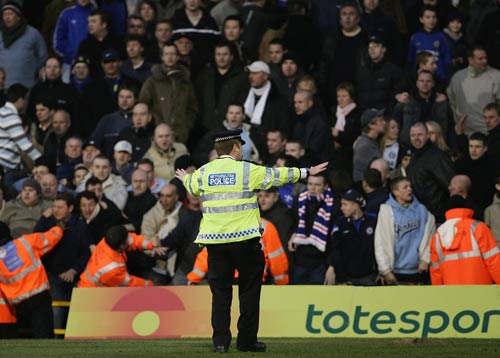League reject call over police costs

The Premier League have rejected calls for clubs to meet the full cost of policing matches.
According to an investigation by BBC Radio Five Live, which included evidence from 13 of the 20 top-flight teams, it cost a total of more than £7.5m to police their games last season - with £4.35m coming from the clubs and the £3.2m shortfall picked up by the local forces.
Under current arrangements, clubs have a minimum legal requirement to pay for any costs incurred inside their stadia or property - but the Association of Chief Police Officers have demanded they also fund match-related security away from grounds.
But the Premier League's chief spokesman Dan Johnson insists clubs should rightfully expect those costs to be met through their tax contributions.
"The law is quite clear - clubs pay for any policing inside the ground and on immediately adjacent property under their control on matchday," he said.
"Any other provision deemed necessary is covered by the state - it's what people pay their taxes for, with the Premier League alone contributing more that £700m a year to the Treasury, let alone the tax take from the 13 million fans who attend Premier League games during the course of a season.
"This long-established principle applies to all individuals and organisations in the UK, from private individuals to shopping centres, pubs and major events, like the Notting Hill Carnival.
"Our clubs work well with their local police forces to make sure that the call on their resources is as little as possible.
"They have invested heavily in all-seater stadia, CCTV and stewarding - as a result the numbers of police required to ensure public safety, and therefore the cost, has reduced over the past 15 years.
"We are always happy to discuss how it might be possible to further reduce costs, or indeed how football can help the police tackle youth crime, but we fail to see why football fans should pay twice for policing."
The ACPO's Stephen Thomas, an assistant chief constable in the British Transport Police, earlier insisted clubs' financial liability should be total.
"The cash we get given to police our various areas across the country...that's provided by government, that's provided by people through council tax and the provision of that is to provide a policing service to those areas and to those communities," he said.
"If we have to take officers away from them to police football we are not able to recover the cost of that, that means our normal police budget is being used for that purpose which means we then have to provide a lesser service to the rest of the community."
Figures were not made available for the other seven teams not included in the survey, with the forces in question deeming it impossible to separate costs incurred by football matches from general policing costs.
In addition to their legal duty of covering the costs of police activity on their property, Premier League clubs also employ their own stewards.
Join our commenting forum
Join thought-provoking conversations, follow other Independent readers and see their replies
Comments
Bookmark popover
Removed from bookmarks